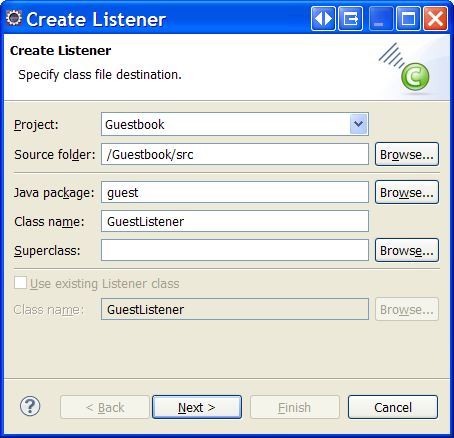Step 3: Add a Context Listener Class
The Guest entities will be stored in an ObjectDB database, which will be represented by a JPA's EntityManagerFactoryjakarta.persistence.EntityManagerFactoryInterface used to interact with the persistence unit, and to create new instances of EntityManager . instance with a global application scope.
We have to register a ServletContextListener to perform initialization and cleanup operations:
- The database will be opened (or created if not existing yet) when the web application starts, by instantiating an
EntityManagerFactory. - The database will be closed when the web application stops (or when the web server shuts down), by closing the
EntityManagerFactory.
To register a ServletContextListener:
- Open the [New Listener] dialog box by right clicking the guest package node (in the [Package Explorer] window), selecting New > Other... > Web > Listener and clicking Next.
- The Java package name should be guest.
- Enter GuestListener as the class name - use exactly that case sensitive class name.
- Click Next and then Select All to enable the Finish button.
- Click Finish to create the new listener class.

Now replace the content of the new source file with the following code:
package guest; import javax.persistence.*; import javax.servlet.*; @WebListener public class GuestListener implements ServletContextListener { // Prepare the EntityManagerFactory & Enhance: public void contextInitialized(ServletContextEvent e) { com.objectdb.Enhancer.enhance("guest.*"); EntityManagerFactory emf = Persistence.createEntityManagerFactory("$objectdb/db/guest.odb"); e.getServletContext().setAttribute("emf", emf); } // Release the EntityManagerFactory: public void contextDestroyed(ServletContextEvent e) { EntityManagerFactory emf = (EntityManagerFactory)e.getServletContext().getAttribute("emf"); emf.close(); } }
The code above:
- Invokes the Enhancer to enhance the entity class, creates an
EntityManagerFactoryinstance and stores it as an application scope attribute in the servlet context - when the web application starts (contextInitialized). - Retrieves the
EntityManagerFactoryfrom the application scope attribute and closes theEntityManagerFactoryand the database - when the application stops (contextDestroyed).
The next step is adding a servlet class that will manage the guestbook page.